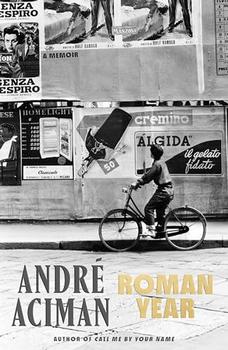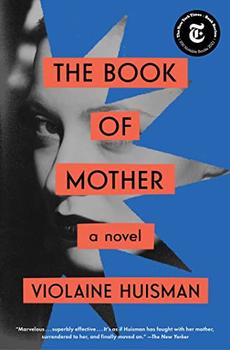Summary | Excerpt | Reviews | Beyond the book | Read-Alikes | Genres & Themes | Author Bio

A Memoir
by Andre AcimanIn this memoir, author André Aciman recounts his family's resettlement for a year in Rome due to President Nasser's expulsion of the Jews from Egypt in the 1950s and '60s. In a cramped Via Clelia apartment procured for Aciman (here a young adult), his younger brother, and his deaf mother by his duplicitous Uncle Claude, the family awaits the later arrival of Aciman's father as he ties up loose ends in Alexandria. Initially disgusted by shoddy Via Clelia and grieving the loss of his family's status, fortune, and home in Egypt, college-aged Aciman anxiously ponders the open paths for his future — he can remain in Italy, relocate to France, or immigrate to America. Meanwhile, his year in Rome proves eventful as he makes new friends and acquaintances, laughs and squabbles with family, and falls in love, all while slowly immersing himself in the city's literature, history, arts, and culture.
Unfolded with nostalgia in the intimacy of Aciman's first person, Roman Year is infused with turbulent melancholy. Alongside the persistent, overhanging trauma of his family's flight from Egypt (the latest in a historical chain of displacement motivated by religious persecution that seemingly renders them permanent refugees), Aciman frequently makes heartrending admissions of his sense of personal alienation. In a particularly devastating and unforgettable passage elucidating the intense emotional closeness between him and his Aunt Flora, he concludes:
"What we did have in common was the reptile in us: we were born cold-blooded. Others, my mother or my brother, taught us what warm-blooded people said, did, and felt; on our own, we'd never have known. We learned to mimic them. We didn't belong to this planet, its time, its roughshod rhythms. We were, and this is what kept Flora and me so close, aliens among earthlings."
Confessing how "I wouldn't know that I loved [Rome] or wanted to love it until I was about to lose it," Aciman channels tragic undercurrents in his narration. For him, the present, as it is occurring, seems to become automatically synonymous with a past that is never wholly retrievable; he feels the loss of people and places at the very same moment he experiences their currency, admitting to the paradox of "booking my passage back before making the journey out, seeking Italy while still in Italy." Aciman's persistent "romanticizing" poses potential comfort to fellow indecisive dreamers and retreating readers, timorous observers who self-consciously retire into the corners. They are perhaps not so alone in their loneliness, seeing this universal feeling wrought throughout the pages.
Though cavernous sadness often seeps into Roman Year, so does frenetic, localized energy and, eventually, tempered joy. Following the sights and sounds of Via Clelia, such as the market noise that is disruptive of his family's sleep for their first few weeks in Rome, Aciman fluidly enumerates the iconic and quotidian streets and locations traversed by foot, bicycle, and public transportation alone and with others, not only in Rome but also in Paris, where he sojourns twice over the course of the book. Pervasive multilingualism, both challenging and advantageous to polyglottic Aciman (and us readers by virtue of his intimate voice) for how it simultaneously connects him to and separates him from others, is visually impactful. The text commonly italicizes phrases foreign to monolingual English-reading audiences — typically in Italian, dialect, and French — only injecting the accommodation of translation afterwards.
This active translation reanimates and enlivens Aciman's memories of Via Clelia and Rome, in which he recalls a high-spirited feeling — "I found myself loving Romanaccio" — after an authentic and genial exchange with Gianlorenzo, a newly hired worker at the neighborhood grocery. As overtaking in its celebration as the moments of Roman Year's grief, this infectious jubilation persists as access to Gianlorenzo's bike provides Aciman with a physical mobility that "opened up Rome to me." The description of Aciman's prolonged ride through the ancient city is a slice of the book's storehouse of effervescence, buoyancy, and sensuality, finally captured in his embrace of a newly experienced scent, bergamot, which becomes a capsule of nostalgia for how "I'd been happy that day."
Consistent with Aciman's novels, such as his perhaps most famous Call Me by Your Name, love in Roman Year is infinitely nuanced — cherished, burdensome, and despised. Aciman's portrayal of the romantic desires and sexual awakening of burgeoning adulthood is candid, curious, and heartbreaking as he seeks physical and emotional intimacy with girl-next-door Amina, motherly older lover Paola, fierce and flirtatious Sabina, and Parisian prostitutes. Desire for other men is depicted as unfetishized and introspective: Aciman is silently shaken after purposely leaning into a man on the bus and fixates on his unspoken desire for Gianlorenzo, a mutual gravitation that lingers just beyond the reach of their words.
Depictions of familial love are tangled, too. Painfully relatable is the embarrassment Aciman feels from his mother's raging bouts of bad temper, the guilt he harbors about rejecting her company in favor of wandering Rome alone, and the shame he experiences over his inadequate expressions of gratitude, all while he patiently guides and translates for her in a world that does not accommodate disabilities such as her deafness. Similarly complex are Aciman's feelings towards his father — they bond over their bookishness and love for Paris, yet Aciman openly acknowledges how his father's philandering, indecisiveness, and stubborn existence as a "single man" away from his mother have contributed to the "dysfunctional" nature of their family. Potential hidden depths are hinted at even beneath Uncle Claude's often one-note villainy; after sampling artichokes prepared by Aciman's mother, he (the brother of Aciman's grandmother) expresses rare vulnerability, crying when he admits they remind him of his own mother's cooking.
Melded into Roman Year's touching emotion is an unabashed intellectual aura. Frequenting used bookstores, Aciman writes a school paper on existentialism, pretends to be a Dostoevsky protagonist, and visits Keats's grave. A scholar of Proust, he is cleverly self-aware of the Proustian qualities of his memoir — he includes a line from his father observing how both he and the iconic French author are sensitive to scent as a conduit to memory; fittingly, a few scenes later, Aciman buys a copy of In Search of Lost Time. In its self-referentiality, Roman Year is subtly optimistic, if beleaguered, as Aciman, perhaps providing instructions on how he wishes his memoir and books in general to be read, muses, "What my favorite authors were asking of me was that I read them intimately—not read my own pulse onto their work, but read their pulse as though it were my own, the height of arrogance." Roman Year is not just a retrospective on the titular place; it is a much labored-over love letter to belles-lettres, mixing compassion and intellectualism in an ancient city that is a reservoir of histories and storytelling, where "Writing might bring me closer to [Via Clelia] than I'd been when I lived here."
![]() This review
first ran in the November 20, 2024
issue of BookBrowse Recommends.
This review
first ran in the November 20, 2024
issue of BookBrowse Recommends.

If you liked Roman Year, try these:

by Seán Hewitt
Published 2025
A stunning debut novel from the acclaimed young Irish poet Seán Hewitt, reminiscent of Garth Greenwell and Justin Torres in the intensity of its evocation of sexual awakening.

by Violaine Huisman
Published 2022
A gorgeous, critically acclaimed debut novel about a young woman coming of age with a dazzling yet damaged mother who lived and loved in extremes.
Your guide toexceptional books
BookBrowse seeks out and recommends the best in contemporary fiction and nonfiction—books that not only engage and entertain but also deepen our understanding of ourselves and the world around us.